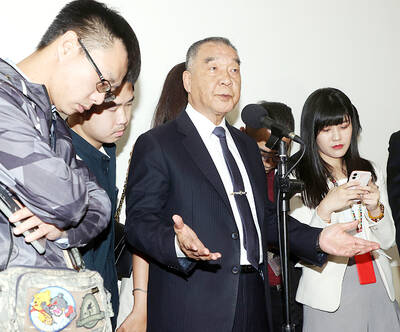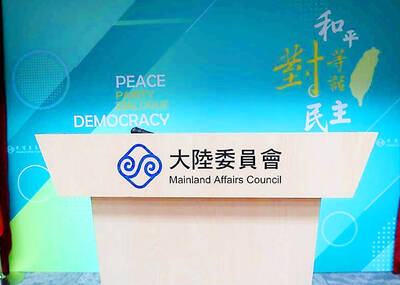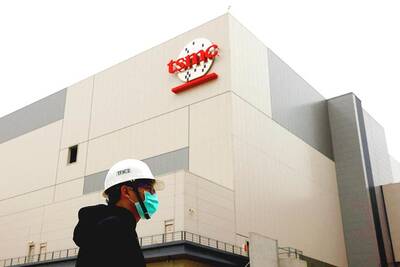The Taipei District Court yesterday found former National Security Bureau chief accountant Hsu Ping-chiang (
"If the prosecutor handling the case decides to file for an appeal and take the case to the Taiwan High Court, a second ruling is possible," district court spokesman Huang Jiunn-ming (
Yesterday's verdict received much public attention as several high-profile government officials were involved in the case.
The scandal began with the disappearance in 1994 of US$4.5 million from a secret fund of US$10.58 million for securing diplomatic relations with South Africa. According to prosecutors, the bureau paid the money to South Africa on behalf of the Ministry of Foreign Affairs in May 1994.
On April 4, 1999, the ministry returned a total of US$10.7 million, including interest, to the bureau. Hsu allegedly asked former chief cashier Liu Kuan-chun (
Liu is himself suspected of embezzling more than NT$192 million (US$5.65 million) from that figure. According to the Bureau of Investigation, he left the country on Sept. 3, 2000, for Shanghai.
He reappeared in Bangkok in January 2002 and then went to North America. Liu is still on the run.
On Nov. 17 last year, the Taipei Prosecutor's Office char-ged Hsu and Liu with corruption and asked the court for a sentence of 15 years for Hsu and 12 years for Liu.
Former China Development Holding Corp chairman Liu Tai-ying (劉泰英), who was president of the Taiwan Research Institute at the time, allegedly wired money to Ruentex Corp chairman Yin Yen-liang's (尹衍樑) bank accounts in the US and Singapore. Yin then allegedly wired the money to one of Ruentex's bank accounts in Taiwan, after which he "donated" US$3 million of it to the Taiwan Research Institute.
On April 14, former president Lee Teng-hui (李登輝) and Hsu went head-to-head during a closed-door hearing at the Taipei District Court over the secret fund.

LANDSLIDES POSSIBLE: The agency advised the public to avoid visiting mountainous regions due to more expected aftershocks and rainfall from a series of weather fronts A series of earthquakes over the past few days were likely aftershocks of the April 3 earthquake in Hualien County, with further aftershocks to be expected for up to a year, the Central Weather Administration (CWA) said yesterday. Based on the nation’s experience after the quake on Sept. 21, 1999, more aftershocks are possible over the next six months to a year, the agency said. A total of 103 earthquakes of magnitude 4 on the local magnitude scale or higher hit Hualien County from 5:08pm on Monday to 10:27am yesterday, with 27 of them exceeding magnitude 5. They included two, of magnitude

A total of 41 US military personnel were stationed in Taiwan as of December last year, a US congressional report said on Friday last week ahead of Tuesday’s passage of an aid package that included US$8 billion for Taiwan. The Congressional Research Service in a report titled Taiwan Defense Issues for Congress said that according to the US Department of Defense’s Defense Manpower Data Center, 41 US military personnel were assigned for duty in Taiwan. Although the normalization of relations with the People’s Republic of China (PRC) in 1979 included a vow to withdraw a military presence from Taiwan, “observers have indicated

NO RECIPROCITY: Taipei has called for cross-strait group travel to resume fully, but Beijing is only allowing people from its Fujian Province to travel to Matsu, the MAC said The Mainland Affairs Council (MAC) yesterday criticized an announcement by the Chinese Ministry of Culture and Tourism that it would lift a travel ban to Taiwan only for residents of China’s Fujian Province, saying that the policy does not meet the principles of reciprocity and openness. Chinese Deputy Minister of Culture and Tourism Rao Quan (饒權) yesterday morning told a delegation of Chinese Nationalist Party (KMT) lawmakers in a meeting in Beijing that the ministry would first allow Fujian residents to visit Lienchiang County (Matsu), adding that they would be able to travel to Taiwan proper directly once express ferry

Taiwan Semiconductor Manufacturing Co (TSMC, 台積電) on Wednesday said that a new chip manufacturing technology called “A16” is to enter production in the second half of 2026, setting up a showdown with longtime rival Intel over who can make the fastest chips. TSMC, the world’s biggest contract manufacturer of advanced computing chips and a key supplier to Nvidia and Apple, announced the news at a conference in Santa Clara, California, where TSMC executives said that makers of artificial intelligence (AI) chips will likely be the first adopters of the technology rather than a smartphone maker. Analysts said that the technologies announced on